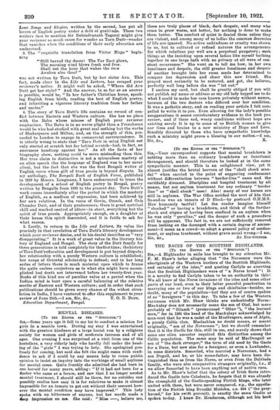MENTAL DISEASES.
[To THE EDITOR OP THE " SPECTATOR."] Sits,—Some years ago it fell to my lot to conduct a mission for girls in a seaside town. During my stay I was entertained with the greatest kindness at a large hostel run by a religious society for women and girls of moderate incomes and of all ages. One evening I was surprised at a visit from one of the hostellers, a very elderly lady who hardly fell under the head- ing of the "girls " I was trying to help. She apologized pro- fusely for coming, but said she felt she might come with confi- dence to ask if I could by any means help to rouse public opinion to insist on inquiry into the workings of small asylums for mental cases. Quite frankly she admitted she had been in one herself for many years, adding: "If it had not been for a doctor who came as a locum, and saw that I no longer needed mental treatment, I should still be there, for no outsider can possibly realize how easy it is for relatives to make it almost impossible for an inmate to get out without their consent how- ever the mental condition may have improved." This lady spoke with no bitterness of anyone, but her words made a deep impression on me. She said: " Miss believe me,
these are truly places of black, dark despair, and many who come in grow worse, not better, for nothing is done to make them better. The comfort of quiet is denied them unless they are violent, and among many of us ladies the common decencies of life are ignored. No active unkindness or cruelty was shown to us, but to cultured or refined natures the arrangements for which relations pay well are a perpetual purgatory; such things as the insisting upon several ladies like myself bathing together in one large bath with no privacy at all were of con- stant occurrence." She went on to tell me how, in her own loneliness and despair, the still greater loneliness and despair of another brought into her room made her determined to conquer her depression and cheer this new friend. She prayed most earnestly to be restored, and got, she believes, perfectly well long before she was " let out."
I enclose my card, but shall be greatly obliged if you will not publish ms; name or address as my old lady begged me to do what I could to make her case known privately without names, because of the two doctors who differed over her condition. It was a pathetic story, and on reading your article I felt com- pelled to write it to you. Even allowing for the lady's possible exaggerations it seems corroboratory evidence to the book you review, and if these sad, weary conditions without hope are existing surely it is up to some of us British women to give our time and brains to a new ministry of Hope and Love. Sensibly directed by those who have sympathetic knowledge such a ministry might prove a blessing to our nation.—I am,


































 Previous page
Previous page